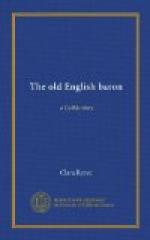“My Lord,” said he, “I rejoice to see you here. I cannot be satisfied with the bare civilities of such a man as you. I aspire to your esteem, to your friendship, and I shall not be happy till I obtain them. I will make you the judge of every part of my conduct, and where you shall condemn me, I will condemn myself.”
The Baron was softened, his noble heart felt its alliance with its counterpart, but he thought the situation of his brother demanded some reserve towards the man who sought his life; but, in spite of himself, it wore off every moment. Lord Clifford related all that had passed, with the due regard to Sir Philip’s honour; he remarked how nobly he concealed the cause of his resentment against the Lord Lovel till the day of combat, that he might not prepossess the judges against him. He enlarged on his humanity to the vanquished, on the desire he expressed to have justice done to his heirs; finally, he mentioned his great respect for the Lord Fitz-Owen, and the solicitude he shewed to have him come to settle the estate of the sick man in favour of his children. Lord Clifford also employed his son to soften Sir Robert, and to explain to him every doubtful part of Sir Philip’s behaviour.
After the travellers had taken some rest, the Lord Graham proposed that they should make a visit to the sick man’s chamber. The lords sent to acquaint him they were coming to visit him, and they followed the messenger. The Lord Fitz-Owen went up to the bedside; he embraced his brother with strong emotions of concern. Sir Robert followed him; then Mr. William.
Lord Lovel embraced them, but said nothing; his countenance shewed his inward agitations. “Lord Fitz-Owen first broke silence.
“I hope,” said he, “I see my brother better than I expected?”
Lord Lovel bit his fingers, he pulled the bed-clothes, he seemed almost distracted; at length he broke out—
“I owe no thanks to those who sent for my relations! Sir Philip Harclay, you have used ungenerously the advantage you have gained over me! you spared my life, only to take away my reputation. You have exposed me to strangers, and, what is worse, to my dearest friends; when I lay in a state of danger, you obliged me to say any thing, and now you take advantage of it, to ruin me in my friends’ affection. But, if I recover, you may repent it!”
Sir Philip then came forward.
“My Lords, I shall take no notice of what this unhappy man has just now said; I shall appeal to you, as to the honourable witnesses of all that has passed; you see it was no more than necessary. I appeal to you for the motives of my treatment of him, before, at, and after our meeting. I did not take his life, as I might have done; I wished him to repent of his sins, and to make restitution of what he unjustly possesses. I was called out to do an act of justice; I had taken the heir of Lovel under my protection, my chief view was to see justice done to him;— what regarded this man was but a secondary motive. This was my end, and I will never, never lose sight of it.”




